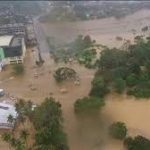Typhoon Phanfone has killed at least 13 people in the Philippines, leaving a trail of devastation through the centre of the country.
The storm battered several islands with gusts of 190km/h (118mph), destroying homes and power lines.
Many people are missing. Thousands were left stranded as they tried to make their way home for Christmas.
Phanfone struck close to regions hit by Typhoon Haiyan – the most powerful storm ever to make landfall – in 2013.
More than 6,000 people were killed in November that year, making it the Philippines’ deadliest typhoon.
Typhoon Phanfone first made landfall on Tuesday night, but continued to pass over the many islands of the central Philippines throughout Christmas Day.
More than 58,000 people were evacuated ahead of the storm and about 15,000 others were stranded at ports when ferries services were suspended.
The extent of the damage began to emerge only on Thursday.
Most deaths occurred in Iloilo and Capiz provinces.
One family was killed when they were swept away by a flash flood as they attempted to get to higher ground, the Philippine ABS-CBN network reported. It added that at least 12 people were missing in Iloilo province alone.
Richard Gordon, the chairman of the Philippine Red Cross, told the BBC: “A lot of people have lost their homes and they need food.”
He added that water and power services had been cut in many areas, and restoring them could take weeks.
The popular tourist island of Boracay appears to have suffered damage, although the extent is unclear.
Korean tourist Jung Byung-joon told AFP news agency that the airport at Kalibo, which services Boracay, was badly damaged.
“Roads remain blocked, but some efforts have been made to clear away the damage,” he said. “It’s pretty bad.”
In the city of Tacloban, a large fire broke out as the winds rose, but the city escaped the worst of the damage.
Tacloban suffered enormous damage during Typhoon Haiyan, when a storm surge pushed water into the low-lying city of more than 220,000 people.
On Thursday Phanfone headed out towards the South China Sea.



